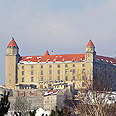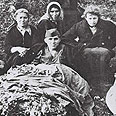

Tagar's grandmother on his father's side, Rachel Leonovitz, immigrated to Israel from Yugoslavia as a young girl in the 1920s. "She died in 1988," Tagar recalled. "My father, Shabtai, who was her only child, passed away eleven years later. After his death, we were going through his papers and photographs, when we came across a diary that had been written by my grandmother, in Ladino."
On his majesty's service
The diary revealed a great deal about Rachel Leonovitz's childhood in Belgrade. She was born into a prominent, well-to-do family; her father, Chaim-Zivko, had been a financial advisor to the King of Yugoslavia. Rachel and her seven siblings were brought up in a huge, elegant mansion in the very center of Belgrade. Chaim Leonovitz died in mysterious circumstances on a trip to Paris just before the outbreak of World War One. "He was sent to arrange the secret transfer of the royal treasures to Marseilles," wrote Rachel in her diary. The authorities reported that he fell ill and died of natural causes, but Rachel and her family suspected foul play. "He knew too much," she wrote.
Even after his death, the family continued to live in style and splendor, says Tagar. "They were sometimes invited to balls at the royal palace, among my grandmother's belongings we found an official, engraved invitation printed on vellum."
Rachel married and together with her new husband she left for Palestine. During the 1930s she went back to Belgrade several times to visit her family. The outbreak of World War Two changed everything: In 1941 the Nazis invaded Yugoslavia and deported virtually all the Jews. The mansion was deserted. The entire family perished. Rachel became the sole survivor.
Alongside the diary, Tagar and his family discovered a file containing ownership deeds and correspondence with the Yugoslavian authorities regarding the family's assets. Tagar was determined to find out what had happened to the properties, and in November 2005 he went to Belgrade.
"I was stunned," he recalls. "The mansion takes up an entire city block on Belgrade's main street. The Faculty of Architecture, the Serbian National Theater and the National Museum are directly opposite." The mansion currently houses a government ministry. "In general you need permission to enter the building," remembers Tagar, "but somehow I managed to sneak in and walk through the first floor. I saw huge halls, black marble pillars and ornate mirrors."
Tagar has no doubt that he will be able to return the mansion to his family, and believes that the time is ripe. "When the communists were in power," he explains, "all property was owned by the state. There would have been no point in pressing a claim. But following the fall of Milosevic, a democratic government was elected. I am determined to restore the deeds to my family, which served the Serbian people faithfully for many years."
A monument to the Jewish community
Although nearly a century has passed since Tagar's grandfather last walked down the mansion's sweeping staircase, the claim of the Leonovitz family to the property appears to be undisputed. "I uncovered a document that unequivocally proves my family's ownership of the entire block on which the mansion stands. Five residential buildings have since been built next to the mansion, where the gardens used to be. In fact, we discovered that the government recognized my grandmother's claims soon after World War Two, in the 1950s."
Tagar's Israeli attorney, Doron Cohen, recently filed an application in Serbia to register ownership of the property. The timing is fortuitous, since according to Serbian law, descendants of locals who lived in Serbia before World War Two have only until the end of July this year to file a claim for ownership. In light of this urgency, Cohen's law office has created a special department to handle property claims for Israelis of Yugoslavian descent. Thanks to the precise records that mostly exist, Cohen has successfully pursued claims to factories, mines and residential buildings that were in Jewish hands before the war.
Tagar's determination to recover his family's assets brought him face-to-face with the tragedy that befell the Jewish community of Belgrade, which numbered some 14,000 people in 1939. The Sajmište concentration camp, where almost all the Jews of Belgrade were slaughtered, lies just a mile away from the hotel in which Tagar stayed.
"I walked to the monument which stands at the site of the camp," he recalls. "There is a plaque which reads, "In this place thousands of people, mostly Jews, were murdered by the Germans." Then and there, I vowed that I would not rest until the mansion is restored to our family. My dream is that it will be used by the Israeli embassy, and that the Israeli flag will be flown from its roof."















